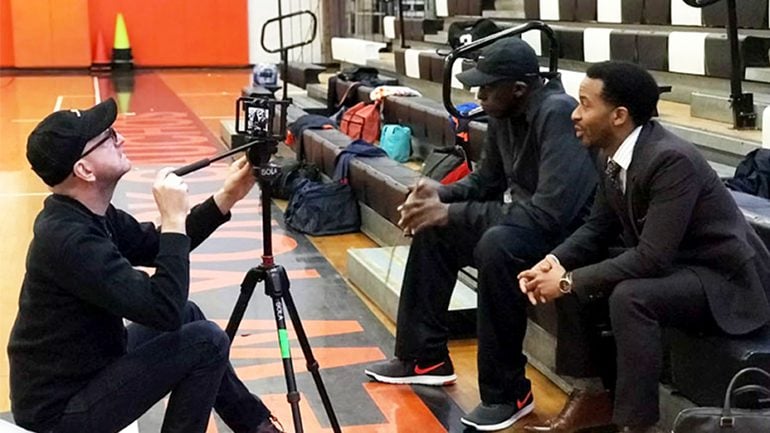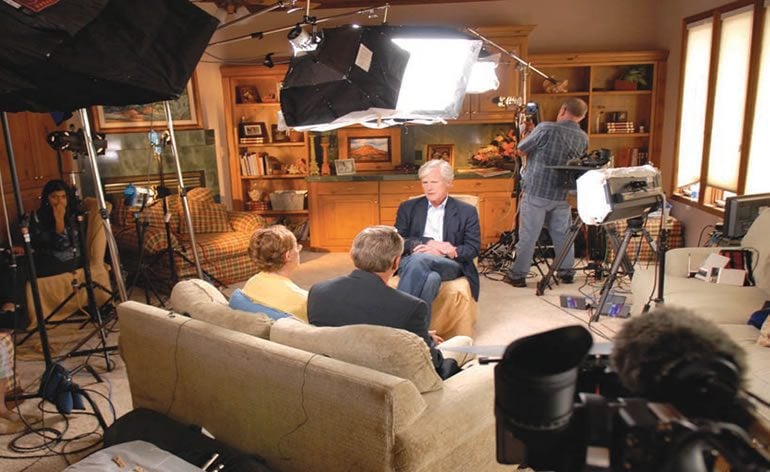Written by Merridith Allen
A query letter is a very simple introduction, and a pitch, from you to a potential buyer, collaborator, or champion of your project, and/or you as a writer.
So, writing query letters is all about access. The goal of writing a query letter is to create a bridge between you/your project, and someone/or a company that you are interested in selling to or collaborating with.
You are not writing a query letter with the goal of gaining something. That is your end- goal for sending out a lot of these, and using other methods, to push your career and project forward.
But it’s not the goal of the actual document.
So, in the same way, you have an objective in a scene, and a super objective for an entire script, the same thing is true here.
A query is not a be-all, end-all. It is one step you can take to push your career forward.
Because you can’t — or most likely can’t — achieve your super objective goal in one scene, and you’re most likely not going to achieve your super objective goal — whether it’s gaining representation, or attaching talent, or a producer to your script — with one query.
So, that is why, a single query letter, has a single, simple goal. Create a bridge.
And, because this is only one way to create that bridge, you don’t have to put so much pressure on the query to get you where you need to go.
It’s an option. It’s one tool in your toolbox.
Now…
The cool thing about query letters is that they are also writing samples. Queries give you an opportunity to show an industry person how you as a writer are able to show up on the page.
It also gives that person an opportunity to see that you:
A) Can follow directions (usually entities that take queries have guidelines, or get these letters all the time, so they have a general sense of how they’d like to see them).
B) Can authentically/concisely pitch your project (this means know your project and know they’re taking projects like it).
C) Can authentically and concisely pitch yourself as a writer (this means know who you are as a writer, and you’re the kind of writer they’re interested in).
So, pitching works on two different levels in a query. You pitch the project, and you pitch yourself as a writer. I’ll get into specifics later.
Before you Start Your Query…
1. Check in with your mindset.
A) Remember you are writing a query to create a bridge. Nothing more. Nothing less.
B) Understand that from the other side of the table, an industry professional is actually looking for you to be the answer to whatever need/problem they have.
You are the creative.
You are the shaman who performs magic on the page.
You have the thing they need, without which, they can’t do their jobs. So…
You are the answer.
You are not begging someone for an opportunity.
You are not desperate.
You are not an option.
You are the answer.
No matter how insecure you might feel on a given day as you move through your creative process, or how insecure you may feel about your career:
You are the answer. This is your mindset. Don’t start writing without understanding this.
Your confidence, or lack-there-of, will show up on the page.
2. Do Your Research
You have to know what you and your writing are the answer to.
A) Research the company, agent, producer, director, production house, executive, manager, or whatever industry professional you’re querying.
This means, know who they are. Know what they want, NOW. Not just what they have produced already, not what they were looking for five years ago.
What do they want now?
Ask yourself: Does my project align with their need?
B) Know WHO they want to work
What kind of writers are they interested in? Are they interested in building relationships? Representing projects only? Are they taking clients now?
You’re looking to find out where you as a writer might fill a gap for them as well.
So, both of these points mean, make sure you pitch your material to someone who is looking for what you have to offer, and that you pitch yourself to someone who is looking for you.
Which means…
Don’t pitch a horror film to someone who manages writers working on writing romantic comedies.
Don’t pitch yourself as a writer who does fight films to a TV manager whose clients are staffed on CW shows.
Know who they are, know who they want to work with, and therefore, know who you are, where you belong, and who you belong with.
Often in the beginning, writers query EVERYONE. You don’t want to do this. You’re wasting their time, and yours (that’s harsh to say, but it’s true).
Which brings me to…
C) Know who you are as a writer (I can’t say it enough).
You are pitching yourself as much as you’re pitching your project.
So, what excites you as a writer?
Where do you want to go with this project, and perhaps the next five years of your career?
Does what you are pitching support that? How?
Ideally, always know what is next — or, if you don’t — understand what kind of project might be next, or what step might be next for you.
3. Be clear on your intention for the project you’re querying.
Do you ultimately want to sell?
Do you want to collaborate? Package?
Will you compromise?
What will you compromise on?
Are you looking to build a relationship/career with this company/person?
Are you simply throwing your project to a buyer/highest bidder?
Knowing exactly what you want and where your boundaries are, creatively, financially, and business wise.
4. Understand what next steps mean for a query letter.
You might not get a meeting out of a query letter. You might not even get a response!
That’s OK.
Remember…
A query is one tool. It practice. It is a bridge. If you do get a response…
You may get a request for a script, synopsis, treatment, or more information.
If that happens, great! Expect nothing more, nothing less.
You are, at this point, continuing the conversation, one potential yes after the next.
Don’t reach too far ahead, and don’t be afraid to ask at the end of every subsequent e- mail/interaction — what are our next steps?
After you get next steps, follow directions precisely. Do nothing more, do nothing less.
OK! Now that you’ve done your research, know yourself, your intentions, and you have a great project to pitch, you can go on to…
5. Make a list of who you will query.
How do you find these people?
A) Word of mouth/recommendations.
B) IMDB Pro
C) Research films and tv shows you wish you worked on (theater companies maybe) and see who reps their writers (if you’re looking for management), or see who produced/directed/worked on them (if you’re looking for a producer/director/actor/ package a team)
D) Film festivals
E) Events
F) Industry parties
G) Referrals
Ask yourself, “How do I get to who/what I want?”
Don’t ask, “Can I?”
Ask yourself, “How?”
Make a list.
Make a plan.
Take a deep breath.
Now you’re ready to write.
Merridith Allen 
Merridith’s short, “Outlaws,” premiered at the Arclight Theater in February 2020, and now she has turned her attention to the production of two independent features.
Merridith is the recipient of many awards and fellowships and was most recently a writer in residence at the San Miguel de Allende Writer’s Conference. As a writing mentor, Merridith has worked with people from all walks of life, from Upper East Side middle school students to budding professionals, to adult education students in Mexico, writing for the first time.
Merridith’s personal website is merridithallen.com, and you can follow her on Instagram and Twitter at @merridithallen.





